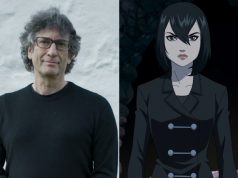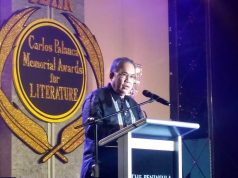British fantasy and comic book writer Neil Gaiman reminded Filipinos to learn to love their homegrown talents after a fan asked him if he would ever write about the Philippines’ folklore and mythology.
A shoutout from a great
The bestselling author made the statement on Twitter after a Filipino fan asked if he would write about Philippine folklore and myths.
After Gaiman said that Filipino writers were more fitting to write about such stories, other literature-savvy Filipinos have shared their recommendations.
There are so many Filipino writers who have written and created such beautiful works about Philippine Mythology – Neil Gaiman is right. So, I would like to give some book recommendations.
— Aviecayl V. Uy (@abcayl) August 8, 2018
Among those who came with suggested reads is Filipino comic book writer and artist Gerry Alanguilan, known for classic such as “Wasted” and “Elmer.”
Thanks for adding me to the list although I would recommend guys like Mervin Malonzo (Tabi Po) and Budjette Tan (Trese). I myself hardly write fantasy. I’m more of a sci-fi, action/comedy, drama guy.
— Gerry Alanguilan (@komikero) August 7, 2018
In a later tweet, Gaiman posted the transcript of his interview with local writer RJ Ledesma during the former’s visit to Manila back in 2010.
More on me and the Philippines, writers and folklore, from 2010: https://t.co/rDJxtEOBZ2
— Neil Gaiman (@neilhimself) August 8, 2018
Gaiman expressed his appreciation for Filipino creators breaking into the fiction scene and his admiration for local hits such as Budjette Tan’s “Trese,” a gritty noir series that places creatures of folklore in a modern-day urban setting.
The 57-year old author is known to be influenced by mythology in his writing. Among his most critically and commercially acclaimed work are “American Gods,” which pits gods from different mythologies against each other in a modern day setting and the classic comic book series “The Sandman,” which explores different mythologies and fairy tales and combines them with more recent superhero lore.
One of his more recent books, “Norse Mythology,” is a rewriting of some of the stories about the Norse gods, but with a more accessible prosaic tone.
As Gaiman has correctly pointed out, recent Filipino literature is replete with authors inspired by Philippine myths and legends.
Among the recent books and comics in the local scene that have been praised for their use of Philippine mythology are the aforementioned “Trese,” Mervin Malonzo’s graphic novel about aswang “Tabi Po“, Arnold Arre’s “Ang Alamat ni Andong Agimat,” Edgar Calabia Samar’s young adult series “Janus Silang,” and Eliza Victoria’s “Wounded Little Gods.”










